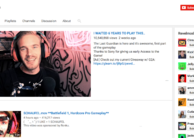|
From Elon Journal of Undergraduate Research in Communications VOL. 5 NO. 2 How Christian Leaders Interact with Twitter
By Zachary Horner
Elon Journal of Undergraduate Research in Communications
2014, Vol. 5 No. 2 | pg. 3/3 | «
Many leaders advise caution. DeYoung writes, “Assume that everyone, everywhere will read what you write and see what you post. . . . the Internet is like God and like the devil. It sees all and forgives nothing.”29 In a blog post on The Gospel Coalition, Dustin Neeley, a pastor who runs the church planting blog cp4us.org, wrote, “The developing technology of social media (blogging, Facebook, Twitter, and so on) can and should be used for the glory of God and the advancement of the gospel in every possible way. But natural- born idolaters like you and me are no more than a few clicks away from making this good thing a god.”30
Some leaders have used Twitter to do ministry directly like Hendrix. A prime example is Rick Warren, who shared a “sermon” through his Facebook and Twitter pages a week after the death of his son Matthew in April 2013.31 Reporters Kurt Streeter and Joseph Serna wrote, “Over the last seven days, Warren has written about his son’s struggles with mental illness, talked about forgiving the person who gave his son an unregistered gun, cited Bible verses that give him comfort and even taken on Internet ‘haters’ who said they ‘celebrate your pain.’” The article cited several tweets from Warren’s stream, including this: “Someone on the Internet sold Matthew an unregistered gun. I pray he seeks God’s forgiveness. I forgive him. #MATTHEW 6:15.” Speaking about the tweeting, Greg Laurie, the pastor of Harvest Christian Fellowship in Riverside, Ca., said Warren was “modeling how faith works in the real world.”
In January 2014, Christianity Today reported that Lleonart Barroso, a Cuban pastor who says he drew inspiration from German theologian/pastor Dietrich Bonhoeffer, was put under house arrest as “part of a larger crackdown on political dissidents across the country,” the article reports. Barroso used social media such as Twitter to share his experiences with followers. Melissa Kimiadi, the author of the article, wrote, “Utilizing social media, (Barroso) communicates with his supporters as well as further drumming up awareness for a pro-democracy Cuba. His Twitter account is regularly updated with up to 10 tweets a day. He has also blogged his experiences (sometimes translated into English) since 2010. His wife Yoaxis is also active on Twitter.”32
Even though this spiritual good can be done on Twitter, the concern remains on the part of some Christian leaders. “Social media, I think, has a lot of traps for Christians,” Hendrix said. “We have to be thoughtful and purposeful in everything we do, and even though I don’t have a philosophy for using Twitter, I hope that I’m thinking. I think it’s important for Christians to think about the gospel in everything they say, everything they put on Facebook or Twitter.”33 There’s an emphasis from the pastoral community for caution to be exercised. Speaking about himself, Piper expresses, “(Twitter)’s just fraught with dangers, especially ego dangers of people saying, “O yeah, I’ll get an account. How many followers can I get? Woohoo! I’m up to 100 followers!” or whatever. I just think it’s so unbelievably dangerous, so I want to be checking myself all the time about why I do this. Do I really love the church and want to bless the church? Or do I just like having people listen to me?”34
Wax wrote, “In the heat of the moment, it is easy to say things you wish you could take back. Never has it been easier to have your words broadcast to the world. I’ve seen pastors embarrass themselves through comments they’ve made on a blog, a rant they posted on Facebook, or an insensitive remark on Twitter.”35 Ortlund conveys the advantage of using new media for spreading the message of the Christian faith, but has a warning. “The book of Proverbs speaks clearly about the impact of our words,” he wrote. “With our media, we can now harm and embarrass and stigmatize people with greater force than ever before in human history. We don’t have to be political heavyweights to wield that power. Any blogger will do. Self-restraint has never been more important.”36 Christians who seek to live “above reproach” (a phrase from Philippians 2:15 meaning to be without reason to be accused of wrongdoing) seem to seek caution in how they use their Twitter accounts, because, as Ortlund said, harm can be done with social media outlets.
In his post on The Exchange, Justin Wise cites Gateway Church in Austin, Texas, as an example of how what he calls the “New Media era” can influence a church. He writes that the church “weaves social media into their cultural fabric. Whether it’s volunteering on the church’s digital street team or participating in a real-time church-wide chat on Gateway’s mobile app, they have placed a clear priority on being a social church.”37 He goes on to say that Christian churches need to “understand a fundamental truth of the New Media era: You cannot control the online conversation surrounding your church. You can only take steps to influence it. . . . The question remains--a question which demands an answer from all of us--what will the church do next?” In his book The Social Church, Wise answers that question, by saying that Christian leaders need to adjust how they approach social media, maybe even do things differently than some Christians might expect. He writes, “We need men and women who are willing to challenge long-standing and widely-beloved methods of communicating the gospel message. People who are willing to bring some sacred cows to the barbecue and butcher them in front of everyone.”38
Pastors and other Christian leaders seem to be reluctant to change their message, but as shown by the 30 leaders researched as part of this study, they are more than willing to adapt to the growth of social media in order to reach people with their beliefs. As of July 2013, there were 9,100 tweets per second from the 241 million monthly active users, while 222 million users don’t tweet but watch others tweet39. The emphasis on reaching those people has been a constant in Christian leadership recently. Looking at the dates these 30 leaders joined Twitter, they were not too far behind the times. Rick Warren was the earliest (April 2007), Kevin DeYoung was the latest (May 2012), while 23 of them joined from May 2008 to June 2009.
This also might be considered a reflection of the progress of the relationship between religion and communications. Along with musicians, actors and athletes, Christian leaders are able to reach their followers with their messages of encouragement and challenge. Hendrix says there’s great potential in Twitter being a really solid ministry tool, speaking to its accessibility, and saying that for the current college generation specifically that pastors “probably . . . should use it”40. Religion has become something that is more and more accessible to the current generation through Twitter, just like their favorite athletes and movie stars. In fact, Wise postulates about the impact social media would have had on famous church reformer Martin Luther: “Would social media be his (Martin Luther’s) new printing press? What might his Twitter feed look like? Would he have turned the Ninety-Five Theses into a flashy infographic? Blogged about the merits of infant baptism? Would his job title on LinkedIn be ‘Pastor, Reformer, Beer Drinker’? Maybe he would have configured a way to live-stream his classes, giving access to all who wanted it. Either way, Luther would have been all over social media”41.
These thoughts come out of an on-going discussion in Christian circles about “engaging the culture.” In a blog post, Ed Stetzer wrote, “Engaging culture, contextualization, and relevance are common issues in missiological discussion. They tend to be assumed as we are engage in God’s global mission. As I see it, it is both necessary and dangerous to engage culture. I believe (and have often said) that the church must be a biblically faithful, culturally relevant, counterculture community for the kingdom of God.”42 The comment about “necessary and dangerous” plays itself out in the discussion about the dangers of using tools such as social media. But some Christians-- particularly those who have Twitter accounts-- might argue the necessary part simply by their presence, and ever-growing presence at that, on social media networks.
Twitter has dominated the social landscape, as one might see that little bird stuck to buildings, business cards and at the end of blog posts nowadays. Pastors have taken advantage of that in a big way, and they’re reaching many with their messages of hope. Wise adds on The Exchange: “The 21st-century church has an unimaginable opportunity in social media to extend the borders of God’s Kingdom online. The methods have changed, but the message remains the same.”43
The author is thankful to many, including Dr. George Padgett for his supervision over writing this article. The author is also particularly thankful to Pastor Gary Hendrix for particular insight into pastors and Twitter. The author is also grateful to Dr. Byung Lee for his help in final revisions as this paper was prepared for publication.
Amy O’Leary, “Christian Leaders Are Powerhouses on Twitter,” The New York Times, June 2, 2012, accessed March 15, 2014,http://www.nytimes.com/2012/06/02/technology/christian-leaders-are-powerhouseson-twitter.html?_r=1&.
Clark Campbell, “Social Ecclesia: Spirit-Led Digital Presence,” The Exchange, January 24, 2014, http://www. christianitytoday.com/edstetzer/2014/january/social-ecclesia-spirit-led-digital-presence.html.
Drew Dyck and Kyle Rohane, “Not Tweeting? Repent!,” Leadership Journal, Summer 2013, http://www.christianitytoday.com/le/2013/summer/not-tweeting-repent.html.
Dustin Neeley, “Justification by Twitter,” TGC Voices, May 9, 2012, http://thegospelcoalition.org/blogs/tgc/2012/05/09/justification-by-twitter/.
Ed Stetzer, “How Should We Engage Culture?,” The Exchange, April 16, 2010, http://www.christianitytoday.com/edstetzer/2010/april/how-should-we-engage-culture.html.
Gary Hendrix, interview with Zachary Horner, Burlington, N.C., April 11, 2014.
Jefferson Bethke, e-mail message to the author, March 15, 2014.
Joe Carter, “9 Things You Should Know About Social Media,” TGC Voices, July 17, 2013, http://thegospelcoalition.org/blogs/tgc/2013/07/17/9-things-you-should-know-about-social-media/.
John Piper, “Who Is In Charge of Your @JohnPiper Twitter Account?,” Desiring God, January 2, 2010, http://www.desiringgod.org/interviews/who-is-in-charge-of-your-johnpiper-twitter-account.
John Piper, “Why and How I Am Tweeting,” Desiring God, June 3, 2009, http://www.desiringgod.org/articles/why-and-how-i-am-tweeting.
Justin Wise, The Social Church (Chicago: Moody Publishers, 2014).
Justin Wise, “Social Media and Christian Ministry: Reaching the World for the Kingdom of God,” The Exchange, February 21, 2014, http://www.christianitytoday.com/edstetzer/2014/february/social-mediaand-christian-ministry-reaching-world-for-king.html.
Kevin DeYoung, “The One Indispensable Rule for Using Social Media,” DeYoung, Restless, and Reformed, June 13, 2012, http://thegospelcoalition.org/blogs/kevindeyoung/2012/06/13/the-one-indispensablerule-for-using-social-media/.
Kurt Streeter and Joseph Serna, “Rick Warren uses Facebook, Twitter to share sermon about loss,” Los Angeles Times, April 12, 2013, accessed March 15, 2014, http://articles.latimes.com/2013/apr/12/local/la-me-ln-rick-warren-leads-sermon-in-loss-using-facebook-twitter-20130412.
Melissa Kimiadi, “Cuba Case Study: Bonhoeffer-Inspired Pastor Arrested After Blogs, Tweets, and D.C. Trip,” Christianity Today, January 20, 2014, http://www.christianitytoday.com/gleanings/2014/january/cubacase-study-pastor-mario-lleonart-arrested-csw.html.
Sarah Pulliam Bailey, “Twitter Reaches Out to Christian Leaders at Catalyst’s ‘Be Present’ Conference,” Christianity Today, October 7, 2011, http://www.christianitytoday.com/ct/2011/octoberweb-only/twittercatalyst.html.
Tony Reinke, “Serving Up Tweets: An Interview with Ray Ortlund on Social Media,” Desiring God, March 9, 2012, http://www.desiringgod.org/blog/posts/serving-up-tweets-an-interview-with-ray-ortlund-on-social-media.
Trevin Wax, “4 Things a Pastor Should Consider Before Engaging Social Media,” Kingdom People. February 3, 2014, http://thegospelcoalition.org/blogs/trevinwax/2014/02/03/4-things-a-pastor-should-considerbefore-engaging-social-media/.
- “Company,” Twitter, accessed April 12, 2014, https://about.twitter.com/company.
- Amy O’Leary, “Christian Leaders Are Powerhouses on Twitter,” The New York Times, June 2, 2012,accessed March 15, 2014, http://www.nytimes.com/2012/06/02/technology/christian-leaders-arepowerhouses-on-twitter.html?_r=1&.
- John Piper, “Why and How I Am Tweeting,” Desiring God, June 3, 2009, http://www.desiringgod.org/articles/why-and-how-i-am-tweeting.
- “About,” The Gospel Coallition, http://thegospelcoalition.org/about/who.
- Jefferson Bethke, “Why I Hate Religion, But Love Jesus,” YouTube, January 2012, https://www.youtube.com/watch?v=1IAhDGYlpqY#!.
- amazon.com, “Jesus > Religion: Why He Is So Much Better Than Trying Harder, Doing More, and Being Good Enough,” Accessed April 12, 2014, http://www.amazon.com/Jesus-Religion-Better-Trying-Harder/dp/1400205395.
- Jefferson Bethke, e-mail message to the author, March 15, 2014.
- Sarah Pulliam Bailey, “Twitter Reaches Out to Christian Leaders at Catalyst’s ‘Be Present’ Conference,” Christianity Today, October 7, 2011, http://www.christianitytoday.com/ct/2011/octoberweb-only/twittercatalyst.html.
- Trevin Wax, “4 Things a Pastor Should Consider Before Engaging Social Media,” Kingdom People. February 3, 2014, http://thegospelcoalition.org/blogs/trevinwax/2014/02/03/4-things-a-pastor-should-considerbefore-engaging-social-media/.
- Joe Carter, “9 Things You Should Know About Social Media,” TGC Voices, July 17, 2013, http://thegospelcoalition.org/blogs/tgc/2013/07/17/9-things-you-should-know-about-social-media/.
- Bethke, e-mail interview.
- Clark Campbell, “Social Ecclesia: Spirit-Led Digital Presence,” The Exchange, January 24, 2014, http://www.christianitytoday.com/edstetzer/2014/january/social-ecclesia-spirit-led-digital-presence.html.
- Tony Reinke, “Serving Up Tweets: An Interview with Ray Ortlund on Social Media,” Desiring God, March 9, 2012, http://www.desiringgod.org/blog/posts/serving-up-tweets-an-interview-with-ray-ortlund-on-social-media.
- Drew Dyck and Kyle Rohane, “Not Tweeting? Repent!,” Leadership Journal, Summer 2013, http://www.christianitytoday.com/le/2013/summer/not-tweeting-repent.html.
- Gary Hendrix, interview with Zachary Horner, Burlington, N.C., April 11, 2014.
- Driscoll abandoned use of his Twitter account temporarily on March 15, so a different week was used. For more information on that abandonment: http://www.religionnews.com/2014/03/17/pastor-mark-driscollapologizes-missteps-quits-social-media/.
- John Piper, Twitter post, March 19, 2014, 1:03 p.m., http://twitter.com/johnpiper.
- John Piper, “Who Is In Charge of Your @JohnPiper Twitter Account?,” Desiring God, January 2, 2010, http://www.desiringgod.org/interviews/who-is-in-charge-of-your-johnpiper-twitter-account.
- Tullian Tchividjian, Twitter post, March 23, 2014, 2:46 p.m., http://twitter.com/pastortullian.
- Joyce Meyer, Twitter post, March 17, 2014, 1:30 p.m., http://twitter.com/joycemeyer.
- Russell Moore, Twitter post, March 22, 2014, 7:21 p.m., http://twitter.com/drmoore.
- Andy Stanley, Twitter post, March 20, 2014, 3:31 p.m., http://twitter.com/andystanley.
- Matt Chandler, Twitter post, March 20, 2014, 2:21 p.m., http://twitter.com/mattchandler74.
- Kevin DeYoung, Twitter post, March 20, 2014, 6:30 p.m., http://twitter.com/revkevdeyoung
- Hendrix, interview, April 11, 2014.
- https://twitter.com/mahaneysports
- Hendrix, interview, April 11, 2014.
- O’Leary, “Christian Leaders Are Powerhouses on Twitter.”
- Kevin DeYoung, “The One Indispensable Rule for Using Social Media,” DeYoung, Restless, and Reformed, June 13, 2012, http://thegospelcoalition.org/blogs/kevindeyoung/2012/06/13/the-oneindispensable-rule-for-using-social-media/.
- Dustin Neeley, “Justification by Twitter,” TGC Voices, May 9, 2012, http://thegospelcoalition.org/blogs/tgc/2012/05/09/justification-by-twitter/.
- Kurt Streeter and Joseph Serna, “Rick Warren uses Facebook, Twitter to share sermon about loss,” Los Angeles Times, April 12, 2013, accessed March 15, 2014, http://articles.latimes.com/2013/apr/12/local/la-meln- rick-warren-leads-sermon-in-loss-using-facebook-twitter-20130412.
- Melissa Kimiadi, “Cuba Case Study: Bonhoeffer-Inspired Pastor Arrested After Blogs, Tweets, and D.C. Trip,” Christianity Today, January 20, 2014, http://www.christianitytoday.com/gleanings/2014/january/cubacase-study-pastor-mario-lleonart-arrested-csw.html.
- Hendrix, interview, April 9, 2014.
- Piper, “Who Is In Charge of the @JohnPiper Twitter Account?”
- Wax, “4 Things a Pastor Should Consider Before Engaging Social Media.”
- Reinke, “Serving Up Tweets: An Interview with Ray Ortlund on Social Media.”
- Justin Wise, “Social Media and Christian Ministry: Reaching the World for the Kingdom of God,” The Exchange, February 21, 2014, http://www.christianitytoday.com/edstetzer/2014/february/social-media-andchristian-ministry-reaching-world-for-king.html.
- Justin Wise, The Social Church (Chicago: Moody Publishers, 2014), 26.
- Carter, “9 Things You Should Know About Social Media.”
- Hendrix, interview, April 9, 2014.
- Wise, The Social Church, 30.
- Ed Stetzer, “How Should We Engage Culture?,” The Exchange, April 16, 2010, http://www.
christianitytoday.com/edstetzer/2010/april/how-should-we-engage-culture.html.
- Justin Wise, “Social Media and Christian Ministry.”
Amy O’Leary, “Christian Leaders Are Powerhouses on Twitter,” The New York Times, June 2, 2012, accessed March 15, 2014,http://www.nytimes.com/2012/06/02/technology/christian-leaders-are-powerhouseson-twitter.html?_r=1&.
Clark Campbell, “Social Ecclesia: Spirit-Led Digital Presence,” The Exchange, January 24, 2014, http://www. christianitytoday.com/edstetzer/2014/january/social-ecclesia-spirit-led-digital-presence.html.
Drew Dyck and Kyle Rohane, “Not Tweeting? Repent!,” Leadership Journal, Summer 2013, http://www.christianitytoday.com/le/2013/summer/not-tweeting-repent.html.
Dustin Neeley, “Justification by Twitter,” TGC Voices, May 9, 2012, http://thegospelcoalition.org/blogs/tgc/2012/05/09/justification-by-twitter/.
Ed Stetzer, “How Should We Engage Culture?,” The Exchange, April 16, 2010, http://www.christianitytoday.com/edstetzer/2010/april/how-should-we-engage-culture.html.
Gary Hendrix, interview with Zachary Horner, Burlington, N.C., April 11, 2014.
Jefferson Bethke, e-mail message to the author, March 15, 2014.
Joe Carter, “9 Things You Should Know About Social Media,” TGC Voices, July 17, 2013, http://thegospelcoalition.org/blogs/tgc/2013/07/17/9-things-you-should-know-about-social-media/.
John Piper, “Who Is In Charge of Your @JohnPiper Twitter Account?,” Desiring God, January 2, 2010, http://www.desiringgod.org/interviews/who-is-in-charge-of-your-johnpiper-twitter-account.
John Piper, “Why and How I Am Tweeting,” Desiring God, June 3, 2009, http://www.desiringgod.org/articles/why-and-how-i-am-tweeting.
Justin Wise, The Social Church (Chicago: Moody Publishers, 2014).
Justin Wise, “Social Media and Christian Ministry: Reaching the World for the Kingdom of God,” The Exchange, February 21, 2014, http://www.christianitytoday.com/edstetzer/2014/february/social-mediaand-christian-ministry-reaching-world-for-king.html.
Kevin DeYoung, “The One Indispensable Rule for Using Social Media,” DeYoung, Restless, and Reformed, June 13, 2012, http://thegospelcoalition.org/blogs/kevindeyoung/2012/06/13/the-one-indispensablerule-for-using-social-media/.
Kurt Streeter and Joseph Serna, “Rick Warren uses Facebook, Twitter to share sermon about loss,” Los Angeles Times, April 12, 2013, accessed March 15, 2014, http://articles.latimes.com/2013/apr/12/local/la-me-ln-rick-warren-leads-sermon-in-loss-using-facebook-twitter-20130412.
Melissa Kimiadi, “Cuba Case Study: Bonhoeffer-Inspired Pastor Arrested After Blogs, Tweets, and D.C. Trip,” Christianity Today, January 20, 2014, http://www.christianitytoday.com/gleanings/2014/january/cubacase-study-pastor-mario-lleonart-arrested-csw.html.
Sarah Pulliam Bailey, “Twitter Reaches Out to Christian Leaders at Catalyst’s ‘Be Present’ Conference,” Christianity Today, October 7, 2011, http://www.christianitytoday.com/ct/2011/octoberweb-only/twittercatalyst.html.
Tony Reinke, “Serving Up Tweets: An Interview with Ray Ortlund on Social Media,” Desiring God, March 9, 2012, http://www.desiringgod.org/blog/posts/serving-up-tweets-an-interview-with-ray-ortlund-on-social-media.
Trevin Wax, “4 Things a Pastor Should Consider Before Engaging Social Media,” Kingdom People. February 3, 2014, http://thegospelcoalition.org/blogs/trevinwax/2014/02/03/4-things-a-pastor-should-considerbefore-engaging-social-media/.
Endnotes
- “Company,” Twitter, accessed April 12, 2014, https://about.twitter.com/company.
- Amy O’Leary, “Christian Leaders Are Powerhouses on Twitter,” The New York Times, June 2, 2012,accessed March 15, 2014, http://www.nytimes.com/2012/06/02/technology/christian-leaders-arepowerhouses-on-twitter.html?_r=1&.
- John Piper, “Why and How I Am Tweeting,” Desiring God, June 3, 2009, http://www.desiringgod.org/articles/why-and-how-i-am-tweeting.
- “About,” The Gospel Coallition, http://thegospelcoalition.org/about/who.
- Jefferson Bethke, “Why I Hate Religion, But Love Jesus,” YouTube, January 2012, https://www.youtube.com/watch?v=1IAhDGYlpqY#!.
- amazon.com, “Jesus > Religion: Why He Is So Much Better Than Trying Harder, Doing More, and Being Good Enough,” Accessed April 12, 2014, http://www.amazon.com/Jesus-Religion-Better-Trying-Harder/dp/1400205395.
- Jefferson Bethke, e-mail message to the author, March 15, 2014.
- Sarah Pulliam Bailey, “Twitter Reaches Out to Christian Leaders at Catalyst’s ‘Be Present’ Conference,” Christianity Today, October 7, 2011, http://www.christianitytoday.com/ct/2011/octoberweb-only/twittercatalyst.html.
- Trevin Wax, “4 Things a Pastor Should Consider Before Engaging Social Media,” Kingdom People. February 3, 2014, http://thegospelcoalition.org/blogs/trevinwax/2014/02/03/4-things-a-pastor-should-considerbefore-engaging-social-media/.
- Joe Carter, “9 Things You Should Know About Social Media,” TGC Voices, July 17, 2013, http://thegospelcoalition.org/blogs/tgc/2013/07/17/9-things-you-should-know-about-social-media/.
- Bethke, e-mail interview.
- Clark Campbell, “Social Ecclesia: Spirit-Led Digital Presence,” The Exchange, January 24, 2014, http://www.christianitytoday.com/edstetzer/2014/january/social-ecclesia-spirit-led-digital-presence.html.
- Tony Reinke, “Serving Up Tweets: An Interview with Ray Ortlund on Social Media,” Desiring God, March 9, 2012, http://www.desiringgod.org/blog/posts/serving-up-tweets-an-interview-with-ray-ortlund-on-social-media.
- Drew Dyck and Kyle Rohane, “Not Tweeting? Repent!,” Leadership Journal, Summer 2013, http://www.christianitytoday.com/le/2013/summer/not-tweeting-repent.html.
- Gary Hendrix, interview with Zachary Horner, Burlington, N.C., April 11, 2014.
- Driscoll abandoned use of his Twitter account temporarily on March 15, so a different week was used. For more information on that abandonment: http://www.religionnews.com/2014/03/17/pastor-mark-driscollapologizes-missteps-quits-social-media/.
- John Piper, Twitter post, March 19, 2014, 1:03 p.m., http://twitter.com/johnpiper.
- John Piper, “Who Is In Charge of Your @JohnPiper Twitter Account?,” Desiring God, January 2, 2010, http://www.desiringgod.org/interviews/who-is-in-charge-of-your-johnpiper-twitter-account.
- Tullian Tchividjian, Twitter post, March 23, 2014, 2:46 p.m., http://twitter.com/pastortullian.
- Joyce Meyer, Twitter post, March 17, 2014, 1:30 p.m., http://twitter.com/joycemeyer.
- Russell Moore, Twitter post, March 22, 2014, 7:21 p.m., http://twitter.com/drmoore.
- Andy Stanley, Twitter post, March 20, 2014, 3:31 p.m., http://twitter.com/andystanley.
- Matt Chandler, Twitter post, March 20, 2014, 2:21 p.m., http://twitter.com/mattchandler74.
- Kevin DeYoung, Twitter post, March 20, 2014, 6:30 p.m., http://twitter.com/revkevdeyoung
- Hendrix, interview, April 11, 2014.
- https://twitter.com/mahaneysports
- Hendrix, interview, April 11, 2014.
- O’Leary, “Christian Leaders Are Powerhouses on Twitter.”
- Kevin DeYoung, “The One Indispensable Rule for Using Social Media,” DeYoung, Restless, and Reformed, June 13, 2012, http://thegospelcoalition.org/blogs/kevindeyoung/2012/06/13/the-oneindispensable-rule-for-using-social-media/.
- Dustin Neeley, “Justification by Twitter,” TGC Voices, May 9, 2012, http://thegospelcoalition.org/blogs/tgc/2012/05/09/justification-by-twitter/.
- Kurt Streeter and Joseph Serna, “Rick Warren uses Facebook, Twitter to share sermon about loss,” Los Angeles Times, April 12, 2013, accessed March 15, 2014, http://articles.latimes.com/2013/apr/12/local/la-meln- rick-warren-leads-sermon-in-loss-using-facebook-twitter-20130412.
- Melissa Kimiadi, “Cuba Case Study: Bonhoeffer-Inspired Pastor Arrested After Blogs, Tweets, and D.C. Trip,” Christianity Today, January 20, 2014, http://www.christianitytoday.com/gleanings/2014/january/cubacase-study-pastor-mario-lleonart-arrested-csw.html.
- Hendrix, interview, April 9, 2014.
- Piper, “Who Is In Charge of the @JohnPiper Twitter Account?”
- Wax, “4 Things a Pastor Should Consider Before Engaging Social Media.”
- Reinke, “Serving Up Tweets: An Interview with Ray Ortlund on Social Media.”
- Justin Wise, “Social Media and Christian Ministry: Reaching the World for the Kingdom of God,” The Exchange, February 21, 2014, http://www.christianitytoday.com/edstetzer/2014/february/social-media-andchristian-ministry-reaching-world-for-king.html.
- Justin Wise, The Social Church (Chicago: Moody Publishers, 2014), 26.
- Carter, “9 Things You Should Know About Social Media.”
- Hendrix, interview, April 9, 2014.
- Wise, The Social Church, 30.
- Ed Stetzer, “How Should We Engage Culture?,” The Exchange, April 16, 2010, http://www.
christianitytoday.com/edstetzer/2010/april/how-should-we-engage-culture.html.
- Justin Wise, “Social Media and Christian Ministry.”
Suggested Reading from Inquiries Journal
With social media recently evolving as a platform for social, informational, and political exchanges, it comes as no surprise that in the last few years several politicians have integrated Twitter into their campaigns. The goal of this study was to gain insight into how Republican Congressman Scott Rigell and Democratic candidate... MORE»
Twitter. Facebook. Digg. MySpace. LinkedIn. The list of social media tools could probably run on for paragraphs, and today’s technology changes so rapidly that many industries, including corporations and news media... MORE»
This paper examined the different Twitter strategies used by each of two NFL and NBA teams. The study examined the New York Jets, New York Giants, New York Knicks, and the Brooklyn Nets to analyze the tweets these organizations posted starting one week prior to the opening regular season games―and during those games. Tweets were... MORE»
Something seems different about 2016. Something many of us just can’t place our fingers on. Sure, The Donald looms disconcertingly over us, a threatening testament to American fear, but it’s not like he has transformed the political atmosphere all that much. Historically, politicians have spanned the whole spectrum of... MORE»
Latest in Business & Communications
2021, Vol. 13 No. 09
This research lies at the nexus of political communication theory relating to emotional affect and political processing and the burgeoning field of sentiment analysis. News coverage can affect opinion both through the information it provides and... Read Article »
2021, Vol. 13 No. 06
This research study explores factors that present barriers to reporting workplace incidents and contribute to cultures of non-report. The research purpose was to explore human, workplace/organizational, and external factors identified by industrial... Read Article »
2016, Vol. 8 No. 11
In its beta release, Google Glass was positioned as a groundbreaking technology - a glimpse into a future that has long been promised in science fiction. It was met with media fanfare and consumer interest, despite costing more than most PCs on... Read Article »
2016, Vol. 7 No. 1
Predicting the future of the news industry begins with understanding the history of newspapers and the current news delivery landscape. Because the Internet has brought fundamental shifts to news distribution, successful organizations of the future... Read Article »
2016, Vol. 7 No. 1
Instagram allows users to share a snapshot of their lives with a mass audience in a matter of seconds. This capability and power has not gone unnoticed by celebrities, who are highly aware of the impact their social media accounts have on fans and... Read Article »
2016, Vol. 7 No. 1
Since its development, YouTube, the world's third most popular online destination, has transformed from a video-sharing site into a job opportunity for content creators in both new and mainstream media. Based on content analysis, the study examined... Read Article »
2016, Vol. 7 No. 1
Today, more than 15 million Americans practice yoga, making the ancient Indian discipline synonymous with the Western society's culture of wellness. As a way to market themselves, practitioners and instructors of yoga have utilized Instagram &ndash... Read Article »
|




















